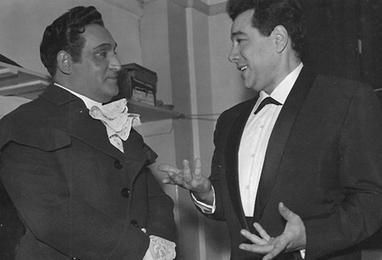
Richard Tucker
Richard Tucker (August 28, 1913 – January 8, 1975) was an American operatic tenor and cantor. Long associated with the Metropolitan Opera, Tucker's career was primarily centered in the United States.[2]
This article is about the American operatic tenor. For other uses, see Richard Tucker (disambiguation).Early life[edit]
Tucker was born Rivn (Rubin) Ticker in Brooklyn, New York, the youngest of five surviving children of Bessarabian Jewish parents who immigrated to the US in 1911.[3][4][5][6] His father, Ysruel (Sam) Ticker, and mother Fanya-Tsipa (Fanny) Ticker resisted using the anglicized "Tucker" their children adopted, but by the time their youngest son entered first grade, he was registered under the surname Tucker . His musical aptitude was discovered early, and was nurtured under the tutelage of Samuel Weisser at the Tifereth Israel synagogue in Lower Manhattan. As a teenager, Tucker's interests alternated between athletics, at which he excelled during his school years, and singing for weddings and bar mitzvahs as a cantorial student. Eventually, he progressed from a part-time cantor at Temple Emanuel in Passaic, New Jersey, to full-time cantorships at Temple Adath Israel in the Bronx and, in June 1943, at the large and prestigious Brooklyn Jewish Center. Until then, Tucker's income derived mainly from his weekly commissions as a salesman for the Reliable Silk Company in Manhattan's garment district.
On February 11, 1936, Tucker married Sara Perelmuth, the youngest child (and only daughter) of Levi and Anna Perelmuth, proprietors of the Grand Mansion, a kosher banquet hall in Manhattan's Lower East Side. At the time of Tucker's wedding to their daughter, the Perelmuths' musically gifted eldest son, Yakob, had progressed from a part-time jazz violinist and lyric tenor vocalist to a national radio star who had already set his sights on an operatic career. Under the management of Sol Hurok, the eldest of the Perelmuth offspring, now renamed Jan Peerce, reached his goal when the general manager of the Metropolitan Opera Company, Edward Johnson, offered him a contract after an impressive audition. When Peerce made his much-acclaimed debut at the Met on November 29, 1941, his sister and her new husband were living with Peerce's parents.[7]
Legacy[edit]
Shortly after his death, the Richard Tucker Music Foundation was established by his widow, sons, colleagues, and friends, "to perpetuate the memory of America's greatest tenor through projects in aid of gifted young singers." In the intervening decades, the Richard Tucker Foundation, whose annual televised concerts have been hosted by Luciano Pavarotti and others, has consistently awarded the largest vocal-music grants and scholarships. Recipients, the first of whom was Rockwell Blake, include sopranos Renée Fleming, Deborah Voigt, Isabel Leonard, tenors Richard Leech, Stephen Costello, James Valenti, Michael Fabbiano and other opera singers of international renown.
In tribute to his legacy at the Met, the city of New York designated the park adjacent to Lincoln Center as Richard Tucker Square.
Sources